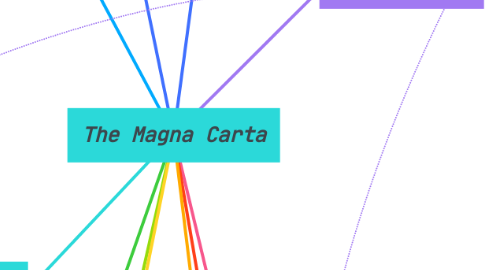
1. Short Term Impact
1.1. pope innocent III annuls it
1.1.1. reissued in 1225 with ommited clauses
1.2. protected rights for mainly the elite
2. Long Term Impact
2.1. Constitutional
2.1.1. U.S. Constitution
2.1.2. The Excellent Privilege of Liberty and Property: being the birth-right of the Free-Born Subjects of England
2.1.3. The Massachusetts Body of Liberties
2.1.4. Bill of Rights
2.1.5. Use in the Thirteen Colonies
2.1.6. The Federalist Papers
2.1.7. cited by politicians and lawyers
2.2. Individual Rights
2.2.1. Jury by trail
2.2.2. Fair trial
2.3. Limited Royal Authority
2.3.1. Less heavy taxation
2.3.2. King is not above law
2.3.3. People are equal before the law
3. Other Important Primary Sources
3.1. Letters and grants of King John
3.2. The Charter of the Forest
4. Religion
4.1. Pope Innocent III
4.1.1. Didn't like the Magna Carta. Considered it "‘illegal, unjust, harmful to royal rights and shameful to the English people’"
4.2. church rights
4.2.1. "The English Church shall be free, and shall have its rights undiminished and its liberties unimpared"
4.2.2. ^all men shall have the right to hold on all liberties, rights and concessions...no matter the place and what occured
5. OTHER
6. The Text Itself
6.1. Vocab Look Up
6.2. Legal Terms
7. Context
7.1. Social
7.1.1. Barons
7.1.1.1. discontent with King John
7.1.2. Royalty
7.1.2.1. King John
7.1.3. Women/Gender
7.1.3.1. forbidding forced marriages
7.2. Economic
7.2.1. High Taxes
7.2.1.1. limited the power of the king from controlling taxes
7.2.2. Overuse of Scutages
7.2.2.1. limits the king's ability to impose scutages without consulting the barons
7.3. Political
7.3.1. Failures of King John
7.3.1.1. failures to uphold promises toward barons
7.3.2. The Anarchy
7.3.2.1. noble religion for their rights own rights
7.3.3. Anglo-French War of 1213-1214
7.3.3.1. Battle of the Bouvines
7.4. Cultural
7.4.1. No rights for people.
7.4.2. King was "above the law"
7.5. Religious
7.5.1. Beckett Controversy
7.5.2. The Papacy
8. Important People
8.1. King John of England
8.1.1. Ruled from 1199 to 1216
8.1.2. Commissioned a seal after taking kingship
8.1.3. Ascended to throne following death of Richard
8.1.3.1. Richard I the Lion-Heart (r. 1189-1199)
8.1.4. Reign marked by failures
8.1.4.1. Heavy taxation
8.1.4.2. Military losses
8.1.4.2.1. Defeated at the Battle of Bouvines in 1214
8.1.4.3. Ecclesiastical conflicts
8.1.4.4. Other conflicts
8.1.4.4.1. Philip II of France
8.1.5. Forced to sign Magna Carta in 1215
8.1.5.1. Est. important principles
8.1.5.1.1. Limited government + legal rights
8.1.6. Link to portrait
8.2. Pope Innocent III
8.2.1. Pope between 1198-1216
8.2.2. One of the most influential popes
8.2.2.1. Excommunicated King John
8.2.2.2. Annulled the Magna Carta
8.2.2.3. Launched crucades
8.2.2.3.1. Demanded for the invasion of Languedoc
8.2.3. First pope trained in city schools
8.2.3.1. Studied law and theology
8.2.4. "Believed secular kings and emperors existed to help the pope"
8.3. Emperor Otto IV
8.3.1. Holy Roman Emperor (r. 1209-1215)
8.3.2. Allied with King John against France
8.3.2.1. Defeated at the Battle of the Bouvines
8.3.2.1.1. Diminished power and influence
8.3.3. Reign marked by conflict
8.3.3.1. Papacy
8.3.3.2. Rival claimants to throne
9. Social Structure
9.1. Rule of Law
9.1.1. All Members of Nobility were free
9.1.1.1. Nobility had extened rights
9.1.2. Protected Rights of Nobility
9.1.2.1. Limited Kings power over nobility
9.2. Barons
9.2.1. Discontent with King John led to the drafting of the Magna Carta
9.2.1.1. King John forced to sign in 1215
9.2.2. Provides military support
9.2.3. Can only be fined in accordance with the degree of their offense
10. Politics
10.1. Becket Controversy
10.1.1. Constitutions of Clarendon
10.1.2. Thomas Becket
10.1.2.1. Archbishop of Canterbury
10.1.2.2. Killed by Henry II knights
10.1.2.2.1. Became martyr
11. Law/Legal
11.1. rights of the people
11.1.1. widowed women werent forced to remarry
11.1.2. right to justice(reader, pg178)
11.1.2.1. right to trial by jury for free men (reader,pg178)
11.1.3. free elections
11.1.4. limited taxation
11.2. relating to king
11.2.1. subjected king to laws preventing abuse of power (pg.220)
11.2.2. limited his power, couldnt change laws w/o permission
11.2.3. limited taxation
11.2.4. king was not allowed to change land for his hunting
